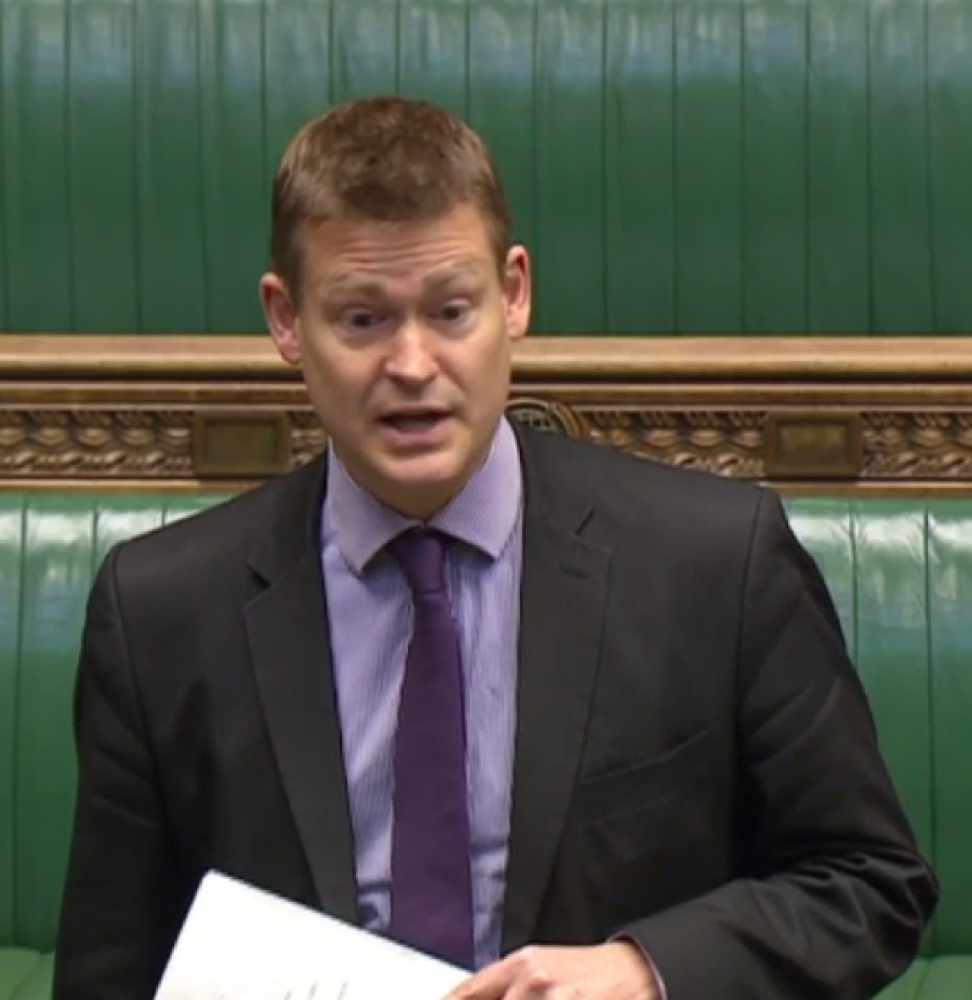
Justin Madders, MP for Ellesmere Port and Neston, has highlighted worsening conditions for some workers during the year-long coronavirus outbreak.
Mr Madders, a Shadow Health spokesman and an employment law specialist, voiced his concerns as he led a ‘Covid-19: Workplace Protection’ debate in the Commons.
“The last year has seen extraordinary changes in the way we live our lives, with enormous hardship, enormous heartache and enormous sacrifice for many,” he said.
“The way many people work has changed but not everyone has had that choice. For many, their jobs have not only continued as before but the dangers and pressures associated with them have increased tenfold.”
Problems had escalated, said Mr Madders, because of the “destructive combination of weak employment laws” with an indifferent Government allowing opportunistic employers to “chip away at hard-won rights”.
“It is a race to the bottom that coronavirus has accelerated. It is time that race was stopped.”
Mr Madders, a solicitor working on employment tribunal issues before entering Parliament, highlighted problems raised by constituents and trade unions including issues faced by people required to self-isolate and others who were now suffering from Long Covid symptoms which, he said, could be added to the list of conditions classed as a disability under the Equality Act 2010.
He criticised greater use of ‘fire and rehire’ policies used by some employers and detailed ever increasing abuse faced by retail workers as a result of anti-Covid measures they were being called upon to enforce in supermarkets and other premises.
Mr Madders said: “Of course, plenty of employers have struggled this year. We know that.
“That is why the furlough scheme was created, but there are some employers out there who, despite taking advantage of furlough, have still pushed ahead with fire and rehire tactics because they saw an opportunity to make a few more quid for their shareholders.”
He added: “Not all the issues raised with me are new deficiencies in workplace protection. They all follow a familiar pattern that has been given an extra dimension by Covid.
“What they add up to is a difficult environment for workers where legitimate concerns are not addressed or, worse, are met with detrimental treatment.”
On the need to self-isolate, Mr Madders said: “For many, the financial consequences of not going into work are significant. Many people do not get company sick pay, and statutory sick pay (SSP)is not enough for people to live on, but…many people are working in jobs where they do not even qualify for SSP.
“It was not until six months into the pandemic that the Government finally recognised that by introducing the self-isolation payment. However, seven out of eight people do not qualify for it. That remains a huge hole in our defences.”
Mr Madders referred to constituency cases where a period of self-isolation was used by an employer to trigger a sickness absence review.
He said the Government could state clearly that a period of self-isolation should be classed as ‘other leave’ that could not be called unauthorised leave, sickness absence or annual leave and could not be used as part of any disciplinary process.
Mr Madders said: “I spent 15 years before I came here representing people who had been victims of workplace injustice. Sadly it seems things have got worse rather than better in the past few years.
“ In the past year those concerns have increased tenfold because the number of issues an employee might reasonably raise with their employer about the inadequate level of protection they get when they go into work has increased considerably.
Paul Scully, Parliamentary Under-Secretary of State for Business, Energy and Industrial Strategy, agreed any reasonable, sensible and forward-thinking employer would understand that treating their employees well had the effect of getting the best out of them and made for productive businesses.
“The duty is on employers to ensure the risk assessment for their business addresses the risk of Covid-19 to anyone affected by the business,” he said.
“The Health and Safety Executive, local authorities and health and safety representatives within businesses — and, of course, trade unions — ensure support is available to help businesses to implement the right control measures.
“So we urge businesses to continue to keep their risk assessments up-to-date and maintain dialogue with their workers over the measures put in place for their safety.”
Pictured - Justin Madders, MP for Ellesmere Port and Neston.


 CHESTER FC STATEMENT
CHESTER FC STATEMENT
 MATCH REPORT: ELLESMERE PORT TOWN 3 - 4 CHESTER WOMEN
MATCH REPORT: ELLESMERE PORT TOWN 3 - 4 CHESTER WOMEN
 People in Chester are invited to join a singing celebration to mark Global Intergenerational Week
People in Chester are invited to join a singing celebration to mark Global Intergenerational Week
 St George returns to Chester on Tuesday 23rd April
St George returns to Chester on Tuesday 23rd April
 Man jailed for stalking Chester MP
Man jailed for stalking Chester MP
 Hundreds of well-dressed ducks gear up for Chester Duck Race
Hundreds of well-dressed ducks gear up for Chester Duck Race
 Police appeal for witnesses to fatal collision in Elton as family pay tribute
Police appeal for witnesses to fatal collision in Elton as family pay tribute
 MATCH REPORT: WYTHENSHAWE 4 - 2 CHESTER FC WOMEN
MATCH REPORT: WYTHENSHAWE 4 - 2 CHESTER FC WOMEN
 Cheshire Police among top performing forces for tackling drink and drug driving
Cheshire Police among top performing forces for tackling drink and drug driving
 ROLES UP FOR GRABS AS CURTAIN SET TO RISE ON THEATRE COMPANY'S NEW PLAY
ROLES UP FOR GRABS AS CURTAIN SET TO RISE ON THEATRE COMPANY'S NEW PLAY
 Pink Floyd: The Dark Side of the Moon returns to Jodrell Bank
Pink Floyd: The Dark Side of the Moon returns to Jodrell Bank
 Welsh Water presents to Chester Residents Associations about pollution in the River Dee
Welsh Water presents to Chester Residents Associations about pollution in the River Dee
 SOLOISTS SET TO SHINE DURING SPECIAL CHESTER PERFORMANCE OF HANDEL'S MESSIAH
SOLOISTS SET TO SHINE DURING SPECIAL CHESTER PERFORMANCE OF HANDEL'S MESSIAH
 Chester and Wirral Football League - Latest Results
Chester and Wirral Football League - Latest Results
 BLUES MATCH REPORT - BRACKLEY TOWN 3 - 1 CHESTER FC
BLUES MATCH REPORT - BRACKLEY TOWN 3 - 1 CHESTER FC
 Inspired Villages complete a 7,500-Mile Charity Cycling Challenge in aid of PROSTaid UK
Inspired Villages complete a 7,500-Mile Charity Cycling Challenge in aid of PROSTaid UK
 Jail term for man who stalked Chester's MP
Jail term for man who stalked Chester's MP
 CFCW MATCH PREVIEW: WYTHENSHAWE v CHESTER FC WOMEN
CFCW MATCH PREVIEW: WYTHENSHAWE v CHESTER FC WOMEN
 BLUES MATCH PREVIEW: BRACKLEY TOWN v CHESTER FC
BLUES MATCH PREVIEW: BRACKLEY TOWN v CHESTER FC
 How to keep your garden healthy during hotter summers
How to keep your garden healthy during hotter summers
Comments
Add a comment